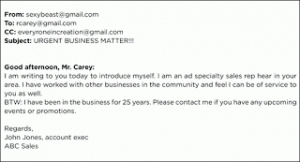During my professional career, I have read a lot of business emails and have written a fair number too.
I am sure you have seen emails like the one below all too often. It is ineffective for a number of obvious reasons: the CAPITAL LETTERS and multiple exclamation marks in the subject line, the weird salutation in bold text, the poorly written message including spelling errors (“hear in your area”), and the fact that the message is sent from the address ‘sexybeast@gmail.com’. I’m sure you can spot additional problems.
So what is a perfect business email and does it even exist? I would say that the layout and tone of an email is heavily dependent on the target person/organisation, how well you know them and which country they are from.
For instance, an addressee from Eastern and Central Europe, France or Italy would most likely prefer a more respectful and formal tone. However, if you are writing to somebody from the United States, your email may be quite informal (of course depending on the level of personal knowledge of the person and their seniority).
I would also suggest that formality of your email would also depend on the industry or organisation your recipient belongs to. For instance, financial services prefer more formal and succinct emails, which sales are more open to an informal conversational style.
But there are some universal truths about effective written business communication and if you would like your recipient to open your email, you should probably consider the following key points:
- Aim to write a captivating subject line – something unusual that is certain to stir recipient’s curiosity and make him or her open your message. Avoid just putting your company name in the subject line as these emails are rarely opened. Sometimes, adding a humorous line can also serve you well but be mindful of the industry/organisation you are dealing with.
- Spend some time on laying out your email and breaking the text into more manageable and easy to read paragraphs. Due to lack of time, a lot of people end up scanning through their emails so add the most important points in the first paragraph. Aim to be brief and to the point.
- Proofread, proofread, and proofread. I can’t stress the importance of correctly spelt words and lack of avoidable mistakes. It goes without saying that you can undermine your chances of closing a sale, finalising an important contract or being invited for an interview if your message is full of grammatical mistakes and incorrect punctuation. You could perhaps print out a copy of your email to check as it is easier to spot mistakes on a printed version. You could also read your email backwards to re-programme your mind to spot mistakes more easily.
- Provide a brief account of case studies, testimonials, and statistics to support your proposition but make sure it is all accurate and honest.
- Add a proper signature: your name, position, company name, website, Twitter and LinkedIn links. You want to make it easy for people to search for you online and to check your credentials.
These are just some suggestions on how to improve your business email communication. I would be interested to receive your own stories of what makes you click ‘open’ or delete when you receive business emails and feel free to email me the worst emails you have encountered!
Dasha Amrom

Follow Us!